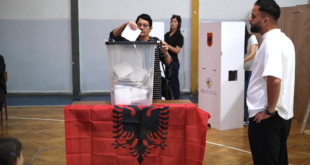TIRANA, Albania
nearly a week after parliamentary elections, Albania’s governing Democratic Party began to assemble a coalition government on Saturday, even as the opposition Socialists decried the move as premature.
Although the electoral commission is still recounting ballots from some polling places, it declared that Prime Minister Sali Berisha’s Democrats had won enough seats to form a government.
Election officials said late Friday that the Democrats won 47 percent of the vote, giving them 71 seats in the 140-seat Parliament, just enough to form a government.
The Socialists, led by Edi Rama, the mayor of Tirana, won 45 percent, or 65 seats. A Socialist splinter party, the Socialist Movement for Integration, came in third, the Central Elections Commission said.
Mr. Berisha, acknowledging that he could at best form a weak government if the results were upheld in the recount, invited the Socialist Movement for Integration to join him in a coalition if the final total confirmed the current count.
The Socialist movement’s leader, former Prime Minister Ilir Meta, accepted the invitation, saying it was “the only one in the country’s interest.”
But the main Socialist Party charged that the Democrats were trying improperly to influence the vote count by declaring victory before all ballots from the election last Sunday were tallied.
The Socialists insisted that the electoral commission, which is recounting ballots from some polling stations after complaints about irregularities, could not declare that the Democrats had won 71 seats while the recounts were pending. They accused Mr. Berisha of trying to sway the electoral commission and threatened to hold street protests.
“I appeal to Berisha to abandon the idea of imposing himself on the Albanian people,” said Gramoz Ruci, a senior Socialist politician, adding, “unless he wants to meet and face the people in the street.”
Albania joined NATO in April and has been under intense international pressure to ensure that the vote was free of the fraud that marred its first six elections held after the Communist government fell in 1990. Both main parties ran on similar platforms, pledging to lift Albania out of poverty and secure its goal of joining the European Union.
Election monitors from the Organization for Security and Cooperation in Europe issued preliminary findings saying that there were improvements and fewer irregularities in this year’s voting, but that some violations persisted, like late openings of polling places.
Full final results are expected in days, after all disputed ballots are counted.
Based on the partial count, the election commission said half of Albania’s 3.1 million registered voters had cast ballots.
 Eurasia Press & News
Eurasia Press & News


